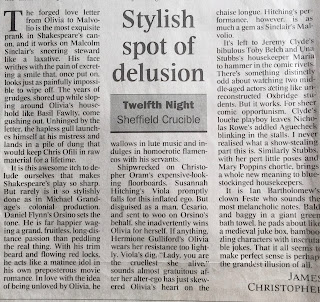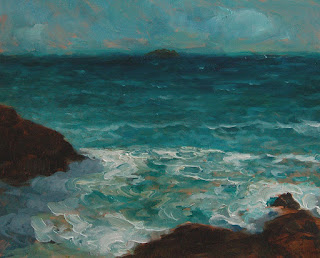I was asked by
William Rycroft at
Vintage to answer a series of questions about Curious Incident, and how the book differs from the play. I think it was Peter Ustinov who said that only when you're interviewed do you discover how you feel about things. Anyway, here's what I said:
Throughout the book Christopher Boone has rituals like
spotting coloured cars; do you or any of the other actors have any
rituals before you go on stage?
Rituals before going on stage, and preparation in general, are very
personal things: they're often unique to each actor and it's quite
important to let people get on with theirs, whatever they may be. I've
personally never been the kind of actor who needs to stare at the wall
to get into character or whatever. I went to LAMDA: we were implicitly
taught not to take ourselves too seriously, I think. Although, to be
fair, that does depend very much on the material. If you're doing
something naturalistic, it's often quite helpful to have some time to
yourself before you go on. But, for me, this play is so much about quick
transitions. You're this, then you're that. Scenes end and begin like
the snap of fingers. So, with this more than any show I've ever been
involved in, I'm talking all sorts of nonsense right until the
millisecond my foot hits the stage. To be honest, I should probably be a
bit more sensitive to others about it. Because, for those who are
getting into character, it's probably quite annoying.
Has being in the play made you approach the book in a different way?
Being in the play hasn't really made me approach the book
differently, to be honest. I must be the only person in the western
hemisphere who, until a year ago, hadn't actually read Mark Haddon's
book. So my ingestion of the book and the play occurred very much in
tandem. They complement each other brilliantly - Simon Stephens is
incredibly faithful to Mark's material: much of the dialogue is repeated
verbatim - and, to be honest, it's got to the point now where I can't
really remember what's in the play and what's in the book. Mark Haddon
said to me a while back that it's the same for him, funnily enough.
Do you have a favourite character in the book and why?
I don't really have a favourite character in the book; most actors
would say the character they're playing, but for me Roger Shears is such
a gigantic loser. The relationship between Christopher and his
mother is something that I find very moving,
though. There's a beautiful dimension to Mark Haddon's Judy Boone which,
because it's written, can only be perceived from reading. When you look
at her letters to her son, there are very slight and subtle spelling
and grammar mistakes. You wouldn't know that from our production because
these are simply read by Gina Isaac, who plays Judy. But what comes
across from that character in the book is that she might be dyslexic and
have slight learning difficulties herself. I think that's a beautifully
understated bit of character: that she, like her estranged son, doesn't
easily fit with societal norms, standards and conventions. Also, it
makes her very raw and human. There's something more pure about her
emotions in the way that they're expressed in these very long,
ungrammatical sentences. And, in my head, it binds those two characters
together in a way that is unique to the book. That said, I think somehow
Gina manages to put that across: in the touchingly clumsy yet heartfelt
way she reaches out to Christopher in our production. These characters
– particularly the parents – are such beautifully flawed human beings
that it just makes them more and more real to me.
Are there any moments in the book that didn’t make it into the play but that you wish had?
Something which fans occasionally feel compelled to point out is that
there's much more Sherlock Holmes in the book than there is in the
play. There's a whole chapter devoted to
The Hound of the Baskervilles, for example. I was fully expecting
Mark Haddon, when we met him, to be an enormous Christopher Boone-esque
Conan Doyle
fan that took Holmes very much as his inspiration for elements of the
story – including its title – but it's funny how things like Holmes and
Watson stopping for tea in Swindon in that story are just lovely little
moments of serendipity; even though they seem somehow predestined.
Which aspects of the book do you think were most important in the staging of the play?
The most important aspect of the book, and the reason that it was
universally agreed that it could never be successfully translated onto
the stage, is that it gets inside its protagonist's head, in a way that
reminds me of
Faulkner,
Conrad
or Salinger. Somehow, through methods best known to themselves, Simon
Stephens managed to do this in alliance with director Marianne Elliott
and designer Bunny Christie. For my money, this achievement cannot be overstated – it's the reason that people respond in the way that they
do to our play. It's properly stylised, interactive and immersive
theatre that grabs anyone who's ever grappled with how to fit into their
environment, how to grow up or how to parent a child. We can get hung
up on the whole portrayal of autism: this play is about all of us.
Approaching the end of this phenomenal tour, what part of the story will you take away with you?
As this enormous tour winds down into
its final weeks, I'm beginning to realise that it'll be a unique job in
my career: probably the one that I'm most proud of above all others,
although I'll need the dust to settle a bit for the objectivity of that
to become fully clear. I'll remember that, in Liverpool over five days
in July, we played to as many people as the West End cast plays to in a
month. I'll remember Sarah, the teenager who wrote to Joshua Jenkins to
say that his performance meant so much to her that she was coming again,
with her parents, so that her friends and family might understand her
more. And I'll remember Josh's definitive, towering performance as
Christopher. As far as I'm concerned, there aren't enough good things
that can be said about him as an actor. I know that many people have
played and will play this part, but I simply cannot imagine that there's
anyone else to touch him.















































